 I also think his music is quite special, and he was a very special person. He was very generous, doing a lot of social work, working with street children. He was very engaged in working for a society in the ‘90s that was starting to develop its own independence, since it was formally declared in 1974. It's not just his music, it's also the way he uses stories about the people that live in Santiago, in the interior and rural areas of the island.
I also think his music is quite special, and he was a very special person. He was very generous, doing a lot of social work, working with street children. He was very engaged in working for a society in the ‘90s that was starting to develop its own independence, since it was formally declared in 1974. It's not just his music, it's also the way he uses stories about the people that live in Santiago, in the interior and rural areas of the island.
Face to face
28.05.2025 | by Graham Douglas
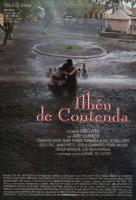 It’s about contesting narratives: not only narratives about Africa, Africans, Capeverdeans, and about our diverse perspectives, but also narratives about what cinema is, and what it can be, who gets to watch and be watched, who gets to speak and be heard. It is slow but necessary work. It is the work of re-inscribing our collective imagination with images that belong to us and that, in turn, transform us, and then the world.
It’s about contesting narratives: not only narratives about Africa, Africans, Capeverdeans, and about our diverse perspectives, but also narratives about what cinema is, and what it can be, who gets to watch and be watched, who gets to speak and be heard. It is slow but necessary work. It is the work of re-inscribing our collective imagination with images that belong to us and that, in turn, transform us, and then the world.
Afroscreen
29.04.2025 | by Pedro José-Marcellino aka P.J. Marcellino
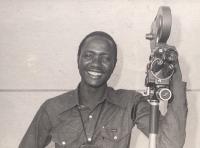 He tells us about the important and complex mission that Amílcar Cabral delegated to them and what it was like to learn the crushing news of his assassination in the middle of this process. It fell to him as his first job to film Amílcar Cabral at an exhibition on the struggle in Conakry, in 1972, and then the transferring of his body to Bissau, capturing the commotion of the Guineans at the death of their greatest thinker and anti-colonial resistance leader.
He tells us about the important and complex mission that Amílcar Cabral delegated to them and what it was like to learn the crushing news of his assassination in the middle of this process. It fell to him as his first job to film Amílcar Cabral at an exhibition on the struggle in Conakry, in 1972, and then the transferring of his body to Bissau, capturing the commotion of the Guineans at the death of their greatest thinker and anti-colonial resistance leader.
Face to face
17.03.2025 | by Marta Lança
 Shot of Avenida Marginal: tourists walk along it for leasure, Cape Verdeans working. The accumulation of images creates a parallel view, of a world that interacts, but is mutually unaware of each other. We then begin to discover a reading line of the movie. The two worlds are presented to us in a certain manichaeism, famously assumed by the directors. On one side, the resilience of the islanders and their ability to take advantage of scarce resources. The struggling Cape Verdeans who resist the constraints that harass them, whose difficult lives are mitigated by interpersonal relationships of solidarity and some alienation.
Shot of Avenida Marginal: tourists walk along it for leasure, Cape Verdeans working. The accumulation of images creates a parallel view, of a world that interacts, but is mutually unaware of each other. We then begin to discover a reading line of the movie. The two worlds are presented to us in a certain manichaeism, famously assumed by the directors. On one side, the resilience of the islanders and their ability to take advantage of scarce resources. The struggling Cape Verdeans who resist the constraints that harass them, whose difficult lives are mitigated by interpersonal relationships of solidarity and some alienation.
Afroscreen
08.05.2024 | by Marta Lança
 A film is often supposed to be a means of communication, and following this principle, it seems interesting to gather different understandings in order to broaden one’s own vision, and that is precisely what the freedom of an experimental visual production can offer. This act of collecting is all the more interesting as it clusters understandings coming from viewers of different cultures. It is in this sense that the director, who has studied oriental languages - notably Persian - and has a great interest in Japanese culture, fosters the creation of multi-centricities, in this case a German-Nippon-Persian-tricentrism, into which viewers can immerse themselves and come out more enriched.
A film is often supposed to be a means of communication, and following this principle, it seems interesting to gather different understandings in order to broaden one’s own vision, and that is precisely what the freedom of an experimental visual production can offer. This act of collecting is all the more interesting as it clusters understandings coming from viewers of different cultures. It is in this sense that the director, who has studied oriental languages - notably Persian - and has a great interest in Japanese culture, fosters the creation of multi-centricities, in this case a German-Nippon-Persian-tricentrism, into which viewers can immerse themselves and come out more enriched.
Afroscreen
28.01.2021 | by Cheong Kin Man and Mathilde Denison
 In the jury, we decided to use this year's excellent crop of films to award not only the awards traditionally bestowed by the festival but also a handful of special prizes and honourable mentions. For this, we offered the following official rationale, both on why we attributed the extra bling, but also on why we enthusiastically applauded this year's programming choices.
In the jury, we decided to use this year's excellent crop of films to award not only the awards traditionally bestowed by the festival but also a handful of special prizes and honourable mentions. For this, we offered the following official rationale, both on why we attributed the extra bling, but also on why we enthusiastically applauded this year's programming choices.
Afroscreen
01.12.2020 | by Pedro José-Marcellino aka P.J. Marcellino
 The book condenses some important aspects of the project. Its authors are not made explicit, pointing to the collaborative nature of this effort of rescue and rereading. But it also ends up suggesting that this living process of documenting complicates the very notion of authorship as a sovereign gesture with the authority to determine how images are exposed (or concealed), or to guide interpretation and impose meaning.
The book condenses some important aspects of the project. Its authors are not made explicit, pointing to the collaborative nature of this effort of rescue and rereading. But it also ends up suggesting that this living process of documenting complicates the very notion of authorship as a sovereign gesture with the authority to determine how images are exposed (or concealed), or to guide interpretation and impose meaning.
Afroscreen
12.02.2019 | by Miguel Cardina
 Em Mais um Dia de Vida, encontramos uma estética hollywoodesca, de construção e celebração do herói Kapuscinski. Terá a mais valia de dar a conhecer a outros públicos (em particular ao mais jovem, pelo estilo de filme de ação) o xadrez político regional e internacional que se jogava em Angola. Porém, ao centrar a narrativa de forma tão redutora na figura do ‘herói jornalista’, o filme não responde à evocação de Carlota, ficando suspenso num jogo dúbio de uso (e abuso) da memória e do esquecimento.
Em Mais um Dia de Vida, encontramos uma estética hollywoodesca, de construção e celebração do herói Kapuscinski. Terá a mais valia de dar a conhecer a outros públicos (em particular ao mais jovem, pelo estilo de filme de ação) o xadrez político regional e internacional que se jogava em Angola. Porém, ao centrar a narrativa de forma tão redutora na figura do ‘herói jornalista’, o filme não responde à evocação de Carlota, ficando suspenso num jogo dúbio de uso (e abuso) da memória e do esquecimento.
Afroscreen
21.01.2019 | by Hélia Santos
 Simone was able to conjure glamour in spite of everything the world said about black women who looked like her. And for that she enjoyed a special place in the pantheon of resistance. That fact doesn’t just have to do with her lyrics or her musicianship, but also how she looked. Simone is something more than a female Bob Marley. It is not simply the voice: It is the world that made that voice, all the hurt and pain of denigration, forged into something otherworldly.
Simone was able to conjure glamour in spite of everything the world said about black women who looked like her. And for that she enjoyed a special place in the pantheon of resistance. That fact doesn’t just have to do with her lyrics or her musicianship, but also how she looked. Simone is something more than a female Bob Marley. It is not simply the voice: It is the world that made that voice, all the hurt and pain of denigration, forged into something otherworldly.
To read
23.03.2016 | by Ta-Nehisi Coates
 We resume our exploration of African queer cinema, thus extending the Queer Focus on Africa cycle featured in the Queer Lisboa festival last year. This time, we’re leaving Africa proper behind for the American and British world, thus reiterating one of our premises... the extension of "African" and "African-ness" that is part of AFRICA.CONT, a cultural force abroad in the world, much as a current in the ocean: integral to the whole but with movements and temperatures all its own - in the beautiful imagery of Achille Mbembe. We are certainly eager to explore the realities that this current embodies in its Central and South American, European and Asian diasporas.
We resume our exploration of African queer cinema, thus extending the Queer Focus on Africa cycle featured in the Queer Lisboa festival last year. This time, we’re leaving Africa proper behind for the American and British world, thus reiterating one of our premises... the extension of "African" and "African-ness" that is part of AFRICA.CONT, a cultural force abroad in the world, much as a current in the ocean: integral to the whole but with movements and temperatures all its own - in the beautiful imagery of Achille Mbembe. We are certainly eager to explore the realities that this current embodies in its Central and South American, European and Asian diasporas.
Afroscreen
25.06.2015 | by José António Fernandes Dias
![The Awakening of African Cinema [1962] The Awakening of African Cinema [1962]](https://www.buala.org/sites/default/files/imagecache/thumb/2013/06/rouch-jean-01-g.jpg) ECAScreening9: Today a new African cinema is coming into being, which is adding something new and significant to the cultural and artistic life of this continent. The importance of this development was underlined at an international round-table discussion held last year in Venice on “Africa and Contemporary Civilization”. At this gathering Unesco presented several studies on the cinema in Africa. The article below is an edited and abridged version of a study by Jean Rouch, in which the French film producer traces the development of the cinema in Africa and looks at some of its new trends. The subject will also be dealt in future issues.
ECAScreening9: Today a new African cinema is coming into being, which is adding something new and significant to the cultural and artistic life of this continent. The importance of this development was underlined at an international round-table discussion held last year in Venice on “Africa and Contemporary Civilization”. At this gathering Unesco presented several studies on the cinema in Africa. The article below is an edited and abridged version of a study by Jean Rouch, in which the French film producer traces the development of the cinema in Africa and looks at some of its new trends. The subject will also be dealt in future issues.
Afroscreen
26.06.2013 | by Jean Rouch
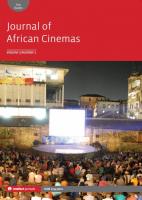 Substantial research has been dedicated to post-colonial productions in African Studies, Postcolonial Studies and Film Studies. Francophone and Anglophone film productions have been extensively assessed in academic writings; however there is a lack of critical research on the subject of Lusophone cinemas and co-productions. This special issue of Journal of African Cinemas intends to address this shortfall in academic work by presenting a critical and informative body of research on the subject.
Substantial research has been dedicated to post-colonial productions in African Studies, Postcolonial Studies and Film Studies. Francophone and Anglophone film productions have been extensively assessed in academic writings; however there is a lack of critical research on the subject of Lusophone cinemas and co-productions. This special issue of Journal of African Cinemas intends to address this shortfall in academic work by presenting a critical and informative body of research on the subject.
Afroscreen
24.08.2012 | by Alessandra Meleiro
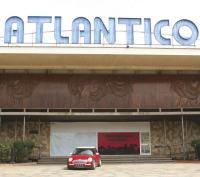 The cinemas in Angola are points of reference in the towns where they found a home. And there are many of them. It’s the kind of infrastructure that you find all over the country, because their heyday started way before independence, allowing the Portuguese colonial authorities to take entertainment – but especially regime propaganda – all over the country. What remains for the telling are the architectural lines, the pleasure for shows and multi-purpose spaces.
The cinemas in Angola are points of reference in the towns where they found a home. And there are many of them. It’s the kind of infrastructure that you find all over the country, because their heyday started way before independence, allowing the Portuguese colonial authorities to take entertainment – but especially regime propaganda – all over the country. What remains for the telling are the architectural lines, the pleasure for shows and multi-purpose spaces.
City
13.12.2010 | by Miguel Gomes
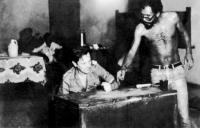 Angola is a leading oil producer in Africa and one
might have expected that some of the financial
benefits of this valuable commodity would be passed onto the country’s film industry. Veteran Angolan filmmaker Mariano Bartolomeu provides an insight into the state of the film and television
industry in this Portuguese speaking country.
Angola is a leading oil producer in Africa and one
might have expected that some of the financial
benefits of this valuable commodity would be passed onto the country’s film industry. Veteran Angolan filmmaker Mariano Bartolomeu provides an insight into the state of the film and television
industry in this Portuguese speaking country.
Afroscreen
14.08.2010 | by Martin Chemhere
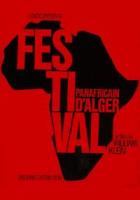 One part of the programm of the 7th Festival de Cine Africano de Tarifa, is called: "Utopia and Reality: 50 years of African Independencies?" Coinciding with the 50th anniversary of the Independence of 17 African countries, FCAT’10 offers a selection of African and non-African productions that explores, illustrates, questions and analyses this independence. There are films which talk about the life and ideas of figures like Aimé Césaire, Patrice Lumumba or Amilcar Cabral, or about the hope and dignity found after so many years of colonialism.
One part of the programm of the 7th Festival de Cine Africano de Tarifa, is called: "Utopia and Reality: 50 years of African Independencies?" Coinciding with the 50th anniversary of the Independence of 17 African countries, FCAT’10 offers a selection of African and non-African productions that explores, illustrates, questions and analyses this independence. There are films which talk about the life and ideas of figures like Aimé Césaire, Patrice Lumumba or Amilcar Cabral, or about the hope and dignity found after so many years of colonialism.
I'll visit
23.05.2010 | by Tarifa African Film Festival
 I began to feel the painful lack of African history in my curriculum and the absence of Afro-Brazilians amongst my college peers. The way blacks were represented (or absent from) the media had bothered me since I was a child. Now, as a film producer, it made me even more uncomfortable. To escape this dilemma, I felt I had to follow my dream of making my own films, but where to begin?
I began to feel the painful lack of African history in my curriculum and the absence of Afro-Brazilians amongst my college peers. The way blacks were represented (or absent from) the media had bothered me since I was a child. Now, as a film producer, it made me even more uncomfortable. To escape this dilemma, I felt I had to follow my dream of making my own films, but where to begin?
Afroscreen
14.04.2010 | by Lilian Solá Santiago
 Dakar became overpopulated towards the beginning of the fifties. A displacement of families away from the inner city neighbourhoods was decided by the colonial state: they were truly "evictions" framed within urban planning projects. The Pikine department was created, regrouping "all of Dakar's excluded". Today it accounts for about one million persons: there is talk about "Pikine-Peking".
Dakar became overpopulated towards the beginning of the fifties. A displacement of families away from the inner city neighbourhoods was decided by the colonial state: they were truly "evictions" framed within urban planning projects. The Pikine department was created, regrouping "all of Dakar's excluded". Today it accounts for about one million persons: there is talk about "Pikine-Peking".
Afroscreen
14.04.2010 | by Rosa Spaliviero
 I also think his music is quite special, and he was a very special person. He was very generous, doing a lot of social work, working with street children. He was very engaged in working for a society in the ‘90s that was starting to develop its own independence, since it was formally declared in 1974. It's not just his music, it's also the way he uses stories about the people that live in Santiago, in the interior and rural areas of the island.
I also think his music is quite special, and he was a very special person. He was very generous, doing a lot of social work, working with street children. He was very engaged in working for a society in the ‘90s that was starting to develop its own independence, since it was formally declared in 1974. It's not just his music, it's also the way he uses stories about the people that live in Santiago, in the interior and rural areas of the island.  It’s about contesting narratives: not only narratives about Africa, Africans, Capeverdeans, and about our diverse perspectives, but also narratives about what cinema is, and what it can be, who gets to watch and be watched, who gets to speak and be heard. It is slow but necessary work. It is the work of re-inscribing our collective imagination with images that belong to us and that, in turn, transform us, and then the world.
It’s about contesting narratives: not only narratives about Africa, Africans, Capeverdeans, and about our diverse perspectives, but also narratives about what cinema is, and what it can be, who gets to watch and be watched, who gets to speak and be heard. It is slow but necessary work. It is the work of re-inscribing our collective imagination with images that belong to us and that, in turn, transform us, and then the world.  He tells us about the important and complex mission that Amílcar Cabral delegated to them and what it was like to learn the crushing news of his assassination in the middle of this process. It fell to him as his first job to film Amílcar Cabral at an exhibition on the struggle in Conakry, in 1972, and then the transferring of his body to Bissau, capturing the commotion of the Guineans at the death of their greatest thinker and anti-colonial resistance leader.
He tells us about the important and complex mission that Amílcar Cabral delegated to them and what it was like to learn the crushing news of his assassination in the middle of this process. It fell to him as his first job to film Amílcar Cabral at an exhibition on the struggle in Conakry, in 1972, and then the transferring of his body to Bissau, capturing the commotion of the Guineans at the death of their greatest thinker and anti-colonial resistance leader.  Shot of Avenida Marginal: tourists walk along it for leasure, Cape Verdeans working. The accumulation of images creates a parallel view, of a world that interacts, but is mutually unaware of each other. We then begin to discover a reading line of the movie. The two worlds are presented to us in a certain manichaeism, famously assumed by the directors. On one side, the resilience of the islanders and their ability to take advantage of scarce resources. The struggling Cape Verdeans who resist the constraints that harass them, whose difficult lives are mitigated by interpersonal relationships of solidarity and some alienation.
Shot of Avenida Marginal: tourists walk along it for leasure, Cape Verdeans working. The accumulation of images creates a parallel view, of a world that interacts, but is mutually unaware of each other. We then begin to discover a reading line of the movie. The two worlds are presented to us in a certain manichaeism, famously assumed by the directors. On one side, the resilience of the islanders and their ability to take advantage of scarce resources. The struggling Cape Verdeans who resist the constraints that harass them, whose difficult lives are mitigated by interpersonal relationships of solidarity and some alienation.  A film is often supposed to be a means of communication, and following this principle, it seems interesting to gather different understandings in order to broaden one’s own vision, and that is precisely what the freedom of an experimental visual production can offer. This act of collecting is all the more interesting as it clusters understandings coming from viewers of different cultures. It is in this sense that the director, who has studied oriental languages - notably Persian - and has a great interest in Japanese culture, fosters the creation of multi-centricities, in this case a German-Nippon-Persian-tricentrism, into which viewers can immerse themselves and come out more enriched.
A film is often supposed to be a means of communication, and following this principle, it seems interesting to gather different understandings in order to broaden one’s own vision, and that is precisely what the freedom of an experimental visual production can offer. This act of collecting is all the more interesting as it clusters understandings coming from viewers of different cultures. It is in this sense that the director, who has studied oriental languages - notably Persian - and has a great interest in Japanese culture, fosters the creation of multi-centricities, in this case a German-Nippon-Persian-tricentrism, into which viewers can immerse themselves and come out more enriched.  In the jury, we decided to use this year's excellent crop of films to award not only the awards traditionally bestowed by the festival but also a handful of special prizes and honourable mentions. For this, we offered the following official rationale, both on why we attributed the extra bling, but also on why we enthusiastically applauded this year's programming choices.
In the jury, we decided to use this year's excellent crop of films to award not only the awards traditionally bestowed by the festival but also a handful of special prizes and honourable mentions. For this, we offered the following official rationale, both on why we attributed the extra bling, but also on why we enthusiastically applauded this year's programming choices.  The book condenses some important aspects of the project. Its authors are not made explicit, pointing to the collaborative nature of this effort of rescue and rereading. But it also ends up suggesting that this living process of documenting complicates the very notion of authorship as a sovereign gesture with the authority to determine how images are exposed (or concealed), or to guide interpretation and impose meaning.
The book condenses some important aspects of the project. Its authors are not made explicit, pointing to the collaborative nature of this effort of rescue and rereading. But it also ends up suggesting that this living process of documenting complicates the very notion of authorship as a sovereign gesture with the authority to determine how images are exposed (or concealed), or to guide interpretation and impose meaning.  Em Mais um Dia de Vida, encontramos uma estética hollywoodesca, de construção e celebração do herói Kapuscinski. Terá a mais valia de dar a conhecer a outros públicos (em particular ao mais jovem, pelo estilo de filme de ação) o xadrez político regional e internacional que se jogava em Angola. Porém, ao centrar a narrativa de forma tão redutora na figura do ‘herói jornalista’, o filme não responde à evocação de Carlota, ficando suspenso num jogo dúbio de uso (e abuso) da memória e do esquecimento.
Em Mais um Dia de Vida, encontramos uma estética hollywoodesca, de construção e celebração do herói Kapuscinski. Terá a mais valia de dar a conhecer a outros públicos (em particular ao mais jovem, pelo estilo de filme de ação) o xadrez político regional e internacional que se jogava em Angola. Porém, ao centrar a narrativa de forma tão redutora na figura do ‘herói jornalista’, o filme não responde à evocação de Carlota, ficando suspenso num jogo dúbio de uso (e abuso) da memória e do esquecimento.  Simone was able to conjure glamour in spite of everything the world said about black women who looked like her. And for that she enjoyed a special place in the pantheon of resistance. That fact doesn’t just have to do with her lyrics or her musicianship, but also how she looked. Simone is something more than a female Bob Marley. It is not simply the voice: It is the world that made that voice, all the hurt and pain of denigration, forged into something otherworldly.
Simone was able to conjure glamour in spite of everything the world said about black women who looked like her. And for that she enjoyed a special place in the pantheon of resistance. That fact doesn’t just have to do with her lyrics or her musicianship, but also how she looked. Simone is something more than a female Bob Marley. It is not simply the voice: It is the world that made that voice, all the hurt and pain of denigration, forged into something otherworldly.  We resume our exploration of African queer cinema, thus extending the Queer Focus on Africa cycle featured in the Queer Lisboa festival last year. This time, we’re leaving Africa proper behind for the American and British world, thus reiterating one of our premises... the extension of "African" and "African-ness" that is part of AFRICA.CONT, a cultural force abroad in the world, much as a current in the ocean: integral to the whole but with movements and temperatures all its own - in the beautiful imagery of Achille Mbembe. We are certainly eager to explore the realities that this current embodies in its Central and South American, European and Asian diasporas.
We resume our exploration of African queer cinema, thus extending the Queer Focus on Africa cycle featured in the Queer Lisboa festival last year. This time, we’re leaving Africa proper behind for the American and British world, thus reiterating one of our premises... the extension of "African" and "African-ness" that is part of AFRICA.CONT, a cultural force abroad in the world, much as a current in the ocean: integral to the whole but with movements and temperatures all its own - in the beautiful imagery of Achille Mbembe. We are certainly eager to explore the realities that this current embodies in its Central and South American, European and Asian diasporas. ![The Awakening of African Cinema [1962] The Awakening of African Cinema [1962]](https://www.buala.org/sites/default/files/imagecache/thumb/2013/06/rouch-jean-01-g.jpg) ECAScreening9: Today a new African cinema is coming into being, which is adding something new and significant to the cultural and artistic life of this continent. The importance of this development was underlined at an international round-table discussion held last year in Venice on “Africa and Contemporary Civilization”. At this gathering Unesco presented several studies on the cinema in Africa. The article below is an edited and abridged version of a study by Jean Rouch, in which the French film producer traces the development of the cinema in Africa and looks at some of its new trends. The subject will also be dealt in future issues.
ECAScreening9: Today a new African cinema is coming into being, which is adding something new and significant to the cultural and artistic life of this continent. The importance of this development was underlined at an international round-table discussion held last year in Venice on “Africa and Contemporary Civilization”. At this gathering Unesco presented several studies on the cinema in Africa. The article below is an edited and abridged version of a study by Jean Rouch, in which the French film producer traces the development of the cinema in Africa and looks at some of its new trends. The subject will also be dealt in future issues.  Substantial research has been dedicated to post-colonial productions in African Studies, Postcolonial Studies and Film Studies. Francophone and Anglophone film productions have been extensively assessed in academic writings; however there is a lack of critical research on the subject of Lusophone cinemas and co-productions. This special issue of Journal of African Cinemas intends to address this shortfall in academic work by presenting a critical and informative body of research on the subject.
Substantial research has been dedicated to post-colonial productions in African Studies, Postcolonial Studies and Film Studies. Francophone and Anglophone film productions have been extensively assessed in academic writings; however there is a lack of critical research on the subject of Lusophone cinemas and co-productions. This special issue of Journal of African Cinemas intends to address this shortfall in academic work by presenting a critical and informative body of research on the subject.  The cinemas in Angola are points of reference in the towns where they found a home. And there are many of them. It’s the kind of infrastructure that you find all over the country, because their heyday started way before independence, allowing the Portuguese colonial authorities to take entertainment – but especially regime propaganda – all over the country. What remains for the telling are the architectural lines, the pleasure for shows and multi-purpose spaces.
The cinemas in Angola are points of reference in the towns where they found a home. And there are many of them. It’s the kind of infrastructure that you find all over the country, because their heyday started way before independence, allowing the Portuguese colonial authorities to take entertainment – but especially regime propaganda – all over the country. What remains for the telling are the architectural lines, the pleasure for shows and multi-purpose spaces.  Angola is a leading oil producer in Africa and one
might have expected that some of the financial
benefits of this valuable commodity would be passed onto the country’s film industry. Veteran Angolan filmmaker Mariano Bartolomeu provides an insight into the state of the film and television
industry in this Portuguese speaking country.
Angola is a leading oil producer in Africa and one
might have expected that some of the financial
benefits of this valuable commodity would be passed onto the country’s film industry. Veteran Angolan filmmaker Mariano Bartolomeu provides an insight into the state of the film and television
industry in this Portuguese speaking country.  One part of the programm of the 7th Festival de Cine Africano de Tarifa, is called: "Utopia and Reality: 50 years of African Independencies?" Coinciding with the 50th anniversary of the Independence of 17 African countries, FCAT’10 offers a selection of African and non-African productions that explores, illustrates, questions and analyses this independence. There are films which talk about the life and ideas of figures like Aimé Césaire, Patrice Lumumba or Amilcar Cabral, or about the hope and dignity found after so many years of colonialism.
One part of the programm of the 7th Festival de Cine Africano de Tarifa, is called: "Utopia and Reality: 50 years of African Independencies?" Coinciding with the 50th anniversary of the Independence of 17 African countries, FCAT’10 offers a selection of African and non-African productions that explores, illustrates, questions and analyses this independence. There are films which talk about the life and ideas of figures like Aimé Césaire, Patrice Lumumba or Amilcar Cabral, or about the hope and dignity found after so many years of colonialism.  I began to feel the painful lack of African history in my curriculum and the absence of Afro-Brazilians amongst my college peers. The way blacks were represented (or absent from) the media had bothered me since I was a child. Now, as a film producer, it made me even more uncomfortable. To escape this dilemma, I felt I had to follow my dream of making my own films, but where to begin?
I began to feel the painful lack of African history in my curriculum and the absence of Afro-Brazilians amongst my college peers. The way blacks were represented (or absent from) the media had bothered me since I was a child. Now, as a film producer, it made me even more uncomfortable. To escape this dilemma, I felt I had to follow my dream of making my own films, but where to begin?  Dakar became overpopulated towards the beginning of the fifties. A displacement of families away from the inner city neighbourhoods was decided by the colonial state: they were truly "evictions" framed within urban planning projects. The Pikine department was created, regrouping "all of Dakar's excluded". Today it accounts for about one million persons: there is talk about "Pikine-Peking".
Dakar became overpopulated towards the beginning of the fifties. A displacement of families away from the inner city neighbourhoods was decided by the colonial state: they were truly "evictions" framed within urban planning projects. The Pikine department was created, regrouping "all of Dakar's excluded". Today it accounts for about one million persons: there is talk about "Pikine-Peking". 